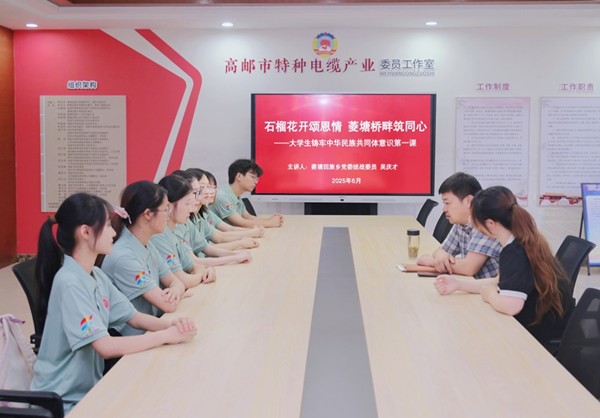College students follow 'ethnicity+economy' integrated path to aid rural vitalization


A group of university students in East China's Jiangsu province have explored an integrated path of combining ethnic culture with industrial development as a way to energize rural markets and aid rural vitalization.
In mid-July, The "Star-Ferry" team, from Changzhou University's School of Foreign Studies, arrived in the province's only ethnic-minority township — Lingtang Hui ethnic township in the city of Gaoyou — seeking ways to help turn ethnic culture into industrial momentum, and aid household businesses in integrating into regional supply chains.
Currently, the ethnic township holds 66 industrial enterprises, each with annual sales reaching at least 20 million yuan ($2.81 million). Some of the businesses were co-founded by partners from the Hui and the Han ethnic groups; cultivating an "ethnic unity".
Focusing on the economic logic of "ethnic unity", the students toured the Lingtang Nationalities Culture Palace, aiming to connect each "cultural symbiosis" exhibit with real production nodes — Muslim-food workshops, micro-factories for ethnic apparel, and rural-tourism cooperatives.
"The same artifact is both a cultural symbol and a SKU (Stock Keeping Unit) on a supply chain," Li Ying, head of the team's economy group and a 2024 student majoring in marketing, said.
The Qiao Dengjiang Academician Memorial Hall became a impromptu classroom for the students, juxtaposing the scientist's spirit of "serving the country through research", with Lingtang's path of "industrializing the township."
"When technological dividends overlap with inter-ethnic trust, the transaction costs drop — that's a micro success story behind Lingtang's industrial growth rate, which beat the city's average for five straight years," Wang Luyao, a faculty advisor from the School of Foreign Studies who did on-site mentoring, said.
At a Muslim village, the intangible-heritage sanzi (fried dough twist) workshop was turned into a cost-benefit case study. "Ethnic craftsmanship, once linked to standardization and branding, can leap in value," Zhou Siyu, a 2022 Business English major from the Hui ethnicity, said.
Wu Qingcai, an official from the township, said that "ethnic unity" is not an extra cost; it is a credit asset. "When the Hui and Han residents trust each other," Wu said, "projects land faster and capital flows faster — that is Lingtang's optimal business environment."
To offer their perspective on the "ethnicity + economy" integration path, the practice team will distill their findings into a bilingual micro-report entitled "Lingtang: A Case of Inter-embedded Ethnic Economy". It will be released on the school's WeChat account and on overseas social media.
You can contact the writer at yinmingyue@chinadaily.com.cn




































